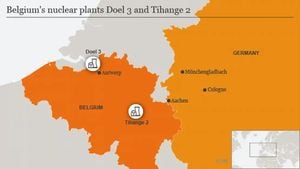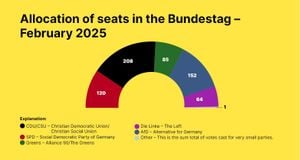Russia is set to implement increased fines for homeowners whose apartment entry doors open outward, with the new penalty amounting to 15,000 rubles, effective from February 1, 2025. This increase from the previous fine of 10,000 rubles reflects the government's commitment to upholding fire safety regulations within residential buildings.
According to Victor Fedoruk, a prominent expert on housing law, the regulations mandate entry doors to open inward. "Entry doors must open inward. Otherwise, they can impede the evacuation of neighbors during a fire," he stated, as reported by AiF. The rationale behind the legislation is rooted in ensuring unhindered escape routes for residents during emergencies such as fires or smoke inhalation incidents. The severity of the consequences associated with non-compliant doors has raised alarms among many residents, many of whom were unaware of these impending sanctions.
The adjustments to fines are not merely punitive; they reflect the rising number of emergency incidents related to inadequate residential safety standards. Many apartments, especially those built before stringent safety regulations were established, have doors opening outward, occupying space needed for safe evacuation. "Doors open outward take up common space of the staircase. Any use of common property must be with consent from all homeowners," Fedoruk elaborates.
The municipality will enforce the new measure, and should neighbors wish to challenge non-compliance, they are empowered to take legal action. This legal backing poses considerable stress for homeowners who find themselves potentially subject to court proceedings if corrective measures are not taken. Residents are encouraged to consult with local housing authorities to ascertain compliance and avoid penalties.
Valery Mamchura, chair of the non-profit partnership "Housing Control" and member of the Public Chamber of the Moscow Region, has publicly criticized the new fines, arguing they unfairly paint 95% of residents as offenders. "The uproar over the increased fine raises public tension. It appears as if 95% of residents living in apartment buildings are all offenders?" he queried. This statement highlights the widespread misunderstanding and concern felt within communities across Russia.
Further complicity arises from the fact many had engaged contractors to replace doors with newer models, only to discover they may inadvertently violate regulations. The average cost for replacing doors—factoring installation—ranges between 20,000 to 30,000 rubles, which could significantly inflict financial strain on families already facing economic challenges. The added expense of complying with new regulations often feels overwhelming for homeowners.
The announcement has sparked debates across various forums, with some individuals advocating for the changes as necessary to bolster safety, wherein others express concerns about the overreach involved. Current regulations dictate, "Doors on evacuation routes must open outward toward the exit of the building," illustrating guidelines already established for new constructions, but now applied retroactively to existing residences.
Local authorities and housing officials may be tasked with increasing inspections to enforce compliance with the law and alleviate fears circulating among homeowners. How these contractors approach both compliance checks and penalty enforcement remains to be seen, as neither the Rosreestr nor emergency services have made definitive statements detailing the monitoring processes to be employed.
Moving forward, experts and lawmakers anticipate launching campaigns to educate residents on existing and forthcoming regulations, aiming to reduce confusion and support adherence to safety norms. With impending regulatory scrutiny set to escalate, homeowners must take proactive measures to verify their door compliance by consulting building plans and familiarizing themselves with applicable rules.
Ensuring residential safety is not solely the responsibility of government bodies but also necessitates active participation from the public. The recent increase to penalties demonstrates the importance authorities place on resident cooperation and community awareness of compliance factors. With everyday safety at stake, the magnitude of homeowner awareness concerning these changes may dictate the effectiveness of such policies.



